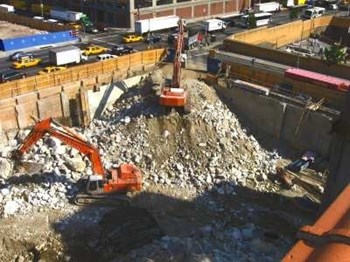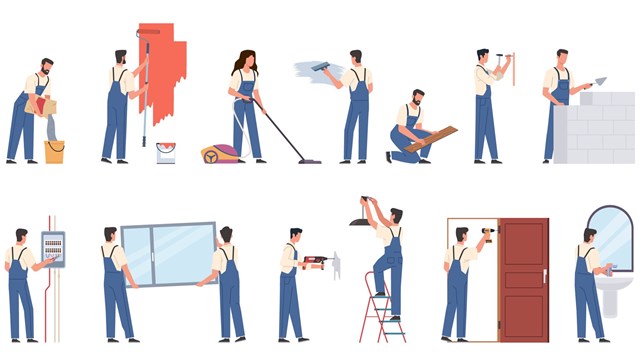
Say that you and your neighbors have been living a quiet, peaceful life on your tree-lined city block for years and years. Suddenly, you see construction workers digging in that vacant lot next to your condo or co-op building. So you go down to the city offices—or these days, go online—and find out that someone has bought the lot and filed plans to construct a new, taller building.
Even if you're not upset about having your vistas blocked by new development, what about the work itself? What can you do if there's excessive noise or dust—or worse, problems like a broken water pipe or phone line?
The kind of notification that builders need to give neighbors can vary with location. According to attorney Marc Luxemburg of the law firm of Snow Becker Krauss in Manhattan, if the builder wants to begin construction that is not "as of right"—for example, if he needs a variance to build higher than is currently permitted under the zoning for that area—he will have to go to the community board, and the neighbors will have to be given an opportunity to voice their concerns.
A similar caveat applies if the construction occurs in a landmarked district—the builder has to get approval from the Landmarks Preservation Commission to make sure the new structure will fit in with the area's historic buildings.
In addition, says Brooklyn attorney Lawrence F. DiGiovanna, if an existing older building is on the site and is being demolished, an asbestos report must be made before the new building plans are approved.
However, if none of these problems exist, the plans have been approved by the city's Department of Buildings (DOB) and the building is constructed "as of right," that's something else again.
Notification of Demolition
Aaron Brashear is the co-founder of the Concerned Citizens of Greenwood Heights and chairs the Buildings and Construction Subcommittee for Brooklyn Community Board 7, which includes Sunset Park and Windsor Terrace as well as that neighborhood. He tracks construction problems in the area on a case-by-case basis.
"The only communications builders have to do," he says, "is to give notification of demolition, if that is the case, about two to five weeks prior to starting. This is usually done by registered mail, and is required by the Department of Buildings. Good developers give six or seven weeks notice, bad developers the week before—or in some cases, we've heard about people who've never gotten the letter."
The DOB, he adds, "does not interact with adjacent property owners unless they interact with the DOB. The residents [of the adjacent building] can take a proactive approach, go to the DOB, pull plans, ask to meet with the plan examiner and go to the community board."
"Larger projects, like the Atlantic Yards, may require the completion of an Environmental Impact Statement," says Kate Lindquist, press secretary for the DOB. "For smaller construction projects, the law does not require a developer to notify and seek approvals from the community."
What are some of the most common complaints that arise when a new construction project begins to take shape next to an existing building? Among the most common objections are noise, especially early in the morning and late at night; garbage, dust and debris.
According to city regulations, construction is only supposed to proceed from 7 a.m. to 6 p.m., Monday through Friday. Areas where dust is generated should be tarped off. Excessive dust and dirt are grounds for a complaint to the DOB, while noise complaints are the province of the Department of Environmental Protection (DEP). Either way, the city can send an inspector out to assess the situation, warn builders and/or issue a violation.
Such complaints, however, are only the least harmful situations. "The biggest complaint we get is damage to adjacent properties," says Brashear. "If they have to do excavation of some sort, obviously for their foundation, the developer more than likely will be going below your foundation and will have to do something called 'underpinning.' If they don't do that, they're supposed to do some sort of shoring to protect your property."
State, City Requirements
This protection for adjacent properties is provided for in a new state law, A7748/S5246, signed just this year by Governor Eliot Spitzer. The law also requires contractors to carry insurance for damage caused by construction, demolition and excavation, a new requirement.
With all the laws and regulations, however, shoddy construction practices continue, perhaps encouraged by the developers' rushing the work through, by the use of non-union day laborers who are not as skilled as union workers, and a variety of other factors.
"They [builders] have to survey the area and have civil engineers do whatever is required to protect property," said Carl Sontz, an engineer who formerly practiced in New York and is now located in Virginia. "Usually, problems occur with fly-by-night operations. A few years ago, some nitwits were working in a basement in the 20s in Manhattan, knocked out one of the structural columns, and the whole building fell down."
Thankfully, incidents like this are the exception, not the rule. Things like vibrations from neighboring construction and excavation destroying property are more typical.
"If it's a common complaint of a number of individuals [within the co-op or condo], the board is probably going to press the issue on behalf of everybody and file a claim for damages with the contractor's insurance company," said Luxemburg.
Hopefully, the new law requiring contractors to carry insurance for demolition, construction and excavation can cut down on litigation and the number of lawsuits resulting from these problems.
What is a builder or developer's legal responsibility to neighboring buildings to minimize dust, noise and other common problems? Well, as we've mentioned, the city code has restrictions on the hours during which construction work can proceed, the amount of noise that is tolerable, how dust should be contained and so forth.
Tough new city legislation that was adopted this past July reduces some of the maximum permissible sound levels and also imposes detailed restrictions on sound level from construction activities as well as from bars, restaurants, car alarms and so forth.
Developers and contractors, says Brashear, "are doing the right thing if they're following DOB bylaws; doing things like shoring, underpinning, putting up a sidewalk shed, waterproofing when necessary, working during normal hours during the day and being a good neighbor." Lest one think he's talking about a fantasy world, Brashear points out that he has a "working relationship" with a developer on his block who has done four developments there, totaling 98 units, and is about to do a fifth.
If developers and contractors do their work properly, they can use dust containment facilities, have blowers inside a building blow into a filtering unit and seal up openings. And as far as construction noise reduction is concerned, new DEP rules specify that all construction sites must post construction noise mitigation plans; that construction equipment be equipped with noise-mitigation devices such as mufflers; that doors to engine enclosures be kept closed, and more.
Start Out on a Friendly Basis
In general, professionals agree that when dealing with construction projects next door, you should first start out on a friendly basis.
Brashear says you should first reach out to the developer and invite him to your co-op or condo board meeting, or a community meeting if residents of several buildings in the area are concerned. In a best-case scenario, he says, the developer agrees to follow your recommendations; in a worst-case scenario, you need to retain an attorney and engage the services of an engineer.
DiGiovanna also says that "communication with the builder is important, to make sure the co-op/condo's concerns are made known. Also, it might be advisable to hire an engineer to inspect your building to determine its condition prior to construction, so that if damage is done, there is a professional who can say what the damage was."
The builder himself, he adds, often is concerned that there could be claims of damage, and might ask, "I'd like to have my engineer to look at your foundation, look at your basement, look at your house, just in case there's damage later on."
Luxemburg says that the developer should "go to the building next door and make sure he has a good relationship with the surrounding buildings. Otherwise, he's opening up to litigation, particularly with regard to potential damage."
Sontz adds that in particular, your co-op or condo board should find out where the new building's HVAC equipment, including the chiller and cooling towers, are going to be, since these items can produce large amounts of vibration and noise. "After the building is built," he says, "it's not a good idea for you if they have to put their rotating machinery in an area close to your property line."
If problems keep happening but you're not ready to go the legal route just yet, you can always call 311, call the Department of Buildings to make a complaint and follow up with your community board.
Finally, there are some things you may just have to live with. If you have some rare glass or porcelain antiques on a window sill near a construction site, it might be a good idea to move them for awhile.
Raanan Geberer is a freelance writer and editor living in New York City.






19 Comments
Leave a Comment